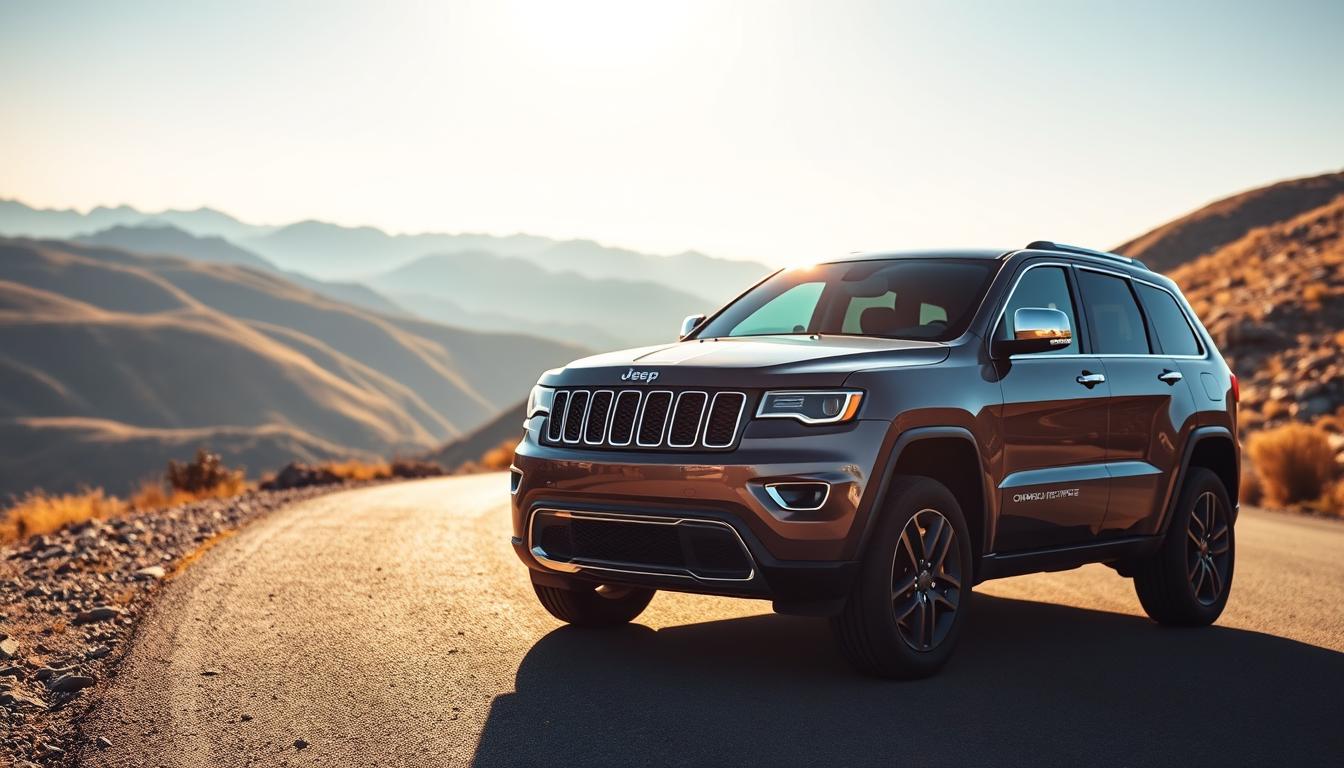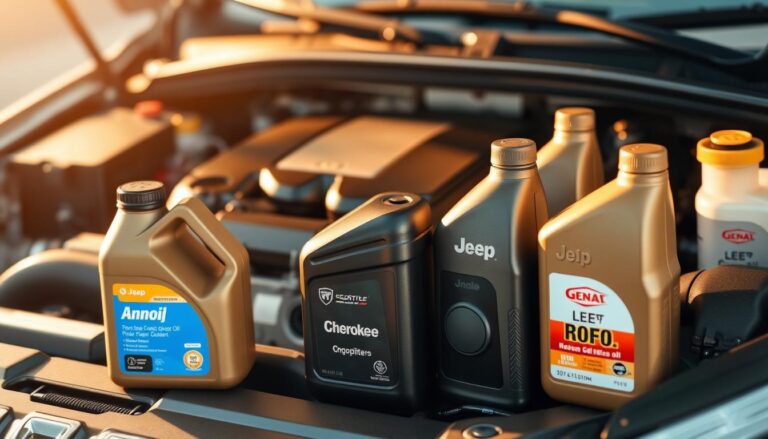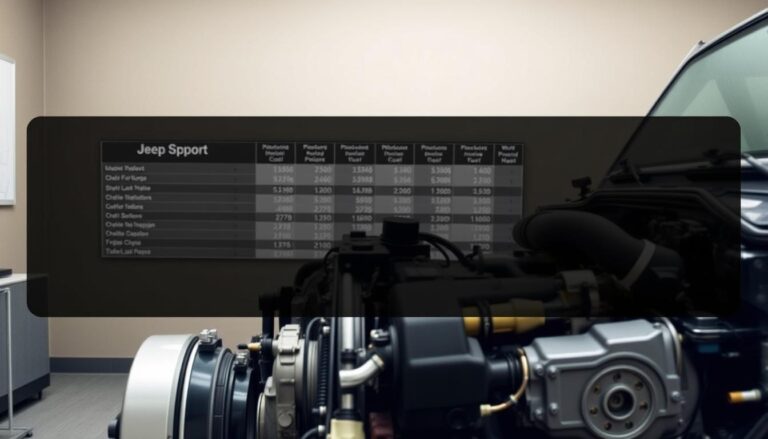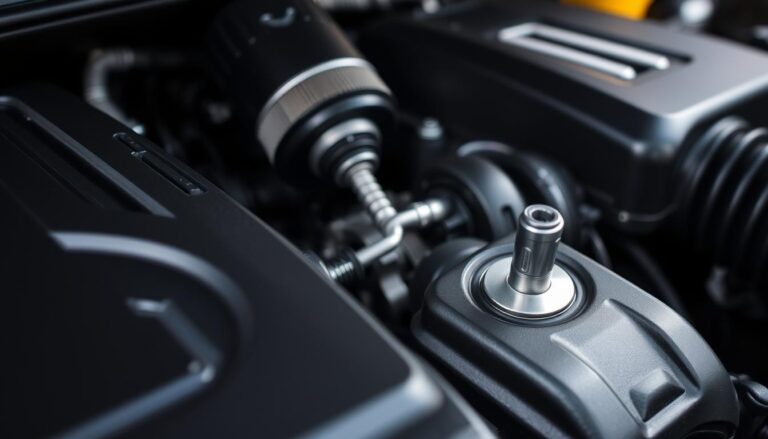The Jeep Grand Cherokee’s Impressive Gas Mileage
The Jeep Grand Cherokee is a sophisticated SUV that breaks the mold of fuel consumption. It offers a powerful yet efficient drive, making it a top choice in its class. Thanks to modern engineering, this SUV has transformed from a gas-guzzler to a fuel-efficient vehicle.
Fuel efficiency is key in the Grand Cherokee, showing Jeep’s dedication to advanced technology. Its engine designs and aerodynamics improve performance without losing fuel economy. This balance of power and efficiency makes the Grand Cherokee stand out among SUVs.
Recent models show big improvements in gas mileage, with various engine options for different needs. Whether you’re driving in the city or on the highway, the Grand Cherokee adapts well. It keeps fuel costs down while delivering great performance.
Looking into fuel efficiency means examining several factors that affect performance. This detailed analysis will explore the Grand Cherokee’s fuel economy. It will show why it’s a favorite among drivers who value both capability and cost-effectiveness.
Understanding Jeep Grand Cherokee’s Fuel Economy Ratings
The Jeep Grand Cherokee is a top choice for those who want power and good fuel economy. It’s perfect for drivers who need a strong vehicle but also care about saving gas. The fuel efficiency of Jeep Grand Cherokee models is impressive, no matter the trim.
Looking at the Grand Cherokee’s fuel use shows how it performs. The fuel economy varies based on the model year and engine type. This means different models use gas differently.
EPA Ratings Across Model Years
The fuel efficiency of Jeep Grand Cherokee models has gotten better over time. Thanks to new tech, the EPA ratings have improved a lot:
- 2015-2018 models averaged 18-21 mpg in city driving
- 2019-2022 models showed enhanced efficiency, reaching 22-25 mpg
- Recent hybrid variants push efficiency even further
City vs Highway Performance Metrics
The way you drive affects how much gas you use. The Grand Cherokee usually does well:
- City driving: 17-19 mpg
- Highway driving: 24-26 mpg
- Slight variations based on specific trim and engine type
Comparing Different Engine Options
Choosing the right engine is key for better fuel economy. The Grand Cherokee has several engine options, each with its own strengths:
| Engine Type | City MPG | Highway MPG |
|---|---|---|
| 3.6L V6 | 19 | 26 |
| 5.7L V8 | 15 | 22 |
| 4xe Hybrid | 23 | 29 |
When picking an engine, think about how you drive. This helps get the best fuel economy for your needs.
The Evolution of Fuel Efficiency in Grand Cherokee Models
The Jeep Grand Cherokee has seen big changes in how much gas it uses over the years. Car engineers have worked hard to make the SUV more fuel-efficient. They’ve done this without losing the vehicle’s power and ability to handle tough terrain.
Important steps in the Jeep Grand Cherokee’s fuel efficiency journey include:
- Introduction of more efficient V6 and V8 engine options
- Implementation of advanced fuel management systems
- Lightweight material integration for improved efficiency
- Aerodynamic design enhancements
Older Grand Cherokees got about 15-17 miles per gallon. Now, the latest models can get up to 19-26 miles per gallon. This depends on the engine and how the SUV is set up.
| Model Year Range | Average City MPG | Average Highway MPG |
|---|---|---|
| 1990-2000 | 15 | 20 |
| 2001-2010 | 16 | 22 |
| 2011-2020 | 19 | 26 |
| 2021-Present | 21 | 28 |
Technological innovations have been key in boosting the Jeep Grand Cherokee’s fuel efficiency. New engine tech, direct fuel injection, and better transmissions have all helped. These changes have made the SUV use less gas in each generation.
Jeep keeps working to make the Grand Cherokee better for both the environment and performance. This shows their dedication to being eco-friendly in the car world.
Latest Technology Innovations Improving Fuel Economy
Jeep Grand Cherokee is leading the way in fuel efficiency with new tech. Drivers looking to save gas will love the smart engineering in recent models.
Today’s cars use fuel better than ever before. The Jeep Grand Cherokee shows big steps forward in using less energy but keeping performance high.
Advanced Engine Management Systems
New engine systems are key to better gas mileage in Jeep Grand Cherokees. They work by:
- Precision fuel injection technology
- Real-time engine performance monitoring
- Dynamic cylinder deactivation
- Adaptive transmission programming
Aerodynamic Design Features
The car’s design also helps save fuel. Jeep’s team has added features to cut down wind resistance and boost performance.
- Streamlined body contours
- Reduced drag coefficient
- Integrated air curtains
- Optimized underbody design
Weight Reduction Strategies
Lighter cars also use less gas. The Grand Cherokee uses new materials and designs to cut weight without losing strength.
- Aluminum body panels
- High-strength steel frame
- Lightweight composite materials
- Precision engineering techniques
These tech updates show Jeep’s dedication to making cars that save fuel without losing out on fun or luxury.
Jeep Grand Cherokee Gas Mileage: A Detailed Look
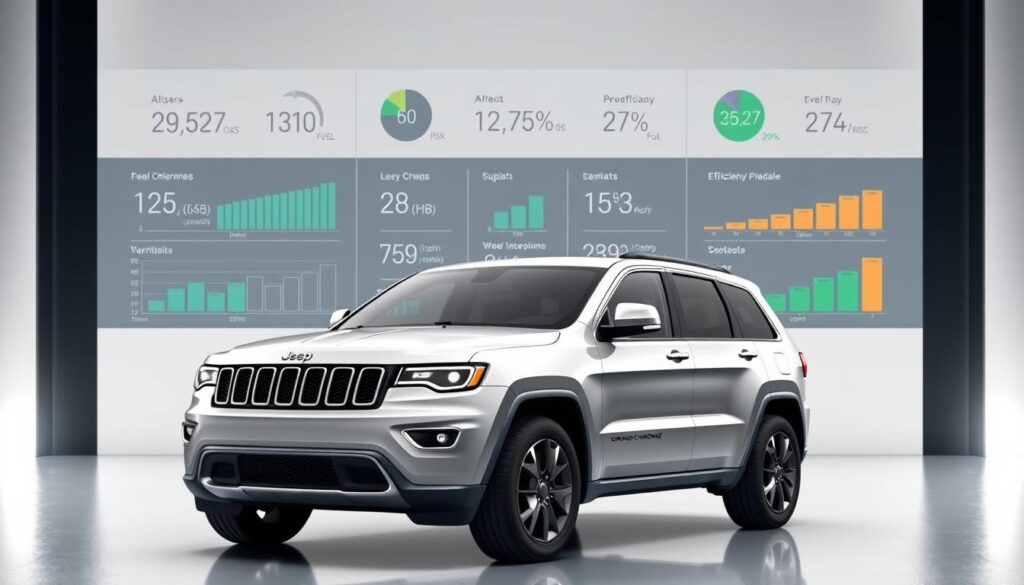
To find the best gas mileage for the Jeep Grand Cherokee, we need to look closely at how it performs in real life. The Grand Cherokee has a smart way to use fuel, changing based on the model and where you drive it.
Several important factors affect how much fuel the Grand Cherokee uses:
- Engine type
- Where you drive it
- The weight of the vehicle
- How well it’s maintained
Our detailed study shows key points about the Grand Cherokee’s fuel use. Fuel efficiency isn’t just about numbers—it’s about understanding how different variables impact your vehicle’s performance.
| Model Year | City MPG | Highway MPG | Combined MPG |
|---|---|---|---|
| 2021 Limited | 19 | 26 | 22 |
| 2022 Overland | 18 | 25 | 21 |
| 2023 Summit | 21 | 28 | 24 |
Choosing the right setup is key to getting the best gas mileage for the Jeep Grand Cherokee. Drivers can improve fuel efficiency by driving smart and keeping their vehicle in top shape.
Comparing Fuel Efficiency Across Different Trim Levels
The Jeep Grand Cherokee comes in various trim levels, each with its own fuel efficiency. Knowing these differences helps buyers choose the right vehicle for their needs.
Several factors affect the fuel efficiency of Jeep Grand Cherokee models. The trim level is a big one. It can change how much gas a vehicle uses and its overall cost to drive.
Laredo vs Limited Fuel Economy
The Laredo and Limited trims have different fuel efficiencies:
- Laredo models usually have a standard engine setup
- Limited trims have more advanced fuel systems
- Fuel efficiency can differ by 1-2 miles per gallon
Summit vs SRT Performance
Trims like Summit and SRT have unique fuel efficiency profiles:
- Summit trim balances performance and fuel use
- SRT models focus on high performance but use more fuel
- Fuel economy differences can range from 3-5 miles per gallon
When choosing a Jeep Grand Cherokee trim, think about your driving habits. The fuel efficiency of Jeep Grand Cherokee models depends on the engine, weight, and design features.
Real-World Fuel Consumption Data from Owners

Jeep Grand Cherokee owners share their real-world gas mileage experiences. They talk about how different driving conditions and vehicle setups affect fuel use.
Our deep dive into owner reports shows some important points about the Grand Cherokee’s fuel efficiency:
- Urban drivers usually get 14-17 miles per gallon in city driving
- Driving on highways often leads to better fuel economy, from 22-25 miles per gallon
- Newer models tend to have more consistent gas mileage
The location where you drive your Jeep Grand Cherokee matters a lot. Drivers in mountainous areas often see lower fuel efficiency than those in flat areas. How you drive also affects how much gas you use.
Several things can change how much gas your Jeep Grand Cherokee uses:
- How you drive (fast vs. slow acceleration)
- The terrain and road conditions
- How well you maintain your vehicle
- The age and model year of your vehicle
Owner feedback shows that regular maintenance and smart driving can boost your Jeep Grand Cherokee’s fuel efficiency. This can improve gas mileage by 10-15%.
Factors Affecting Grand Cherokee’s Fuel Economy
To get better gas mileage in a Jeep Grand Cherokee, it’s important to know what affects fuel efficiency. Many things work together to impact how much fuel your vehicle uses. Drivers can manage these factors to use less fuel.
For those looking to save gas in their Jeep Grand Cherokee, there are key areas to focus on. These areas directly affect how much fuel your vehicle uses:
Driving Conditions Impact
Driving in different places can change how much gas you use. City driving, with lots of stops and starts, uses more gas than driving on the highway. The road and terrain also play a big part in how much fuel you burn.
- Driving up steep mountains uses more gas
- Driving on flat roads saves gas
- Using the gas pedal a lot and braking hard also uses more gas
Maintenance Factors
Keeping your Jeep Grand Cherokee well-maintained is key to saving gas. Taking good care of your vehicle can really help improve your gas mileage and how well your vehicle runs.
| Maintenance Task | Fuel Economy Impact |
|---|---|
| Tire Pressure Check | Up to 3% improvement |
| Regular Oil Changes | Up to 2% fuel efficiency gain |
| Air Filter Replacement | Up to 10% fuel savings |
Weather Effects
Weather can also affect how much gas your Jeep Grand Cherokee uses. Extreme temperatures can make your gas mileage worse. Cold winters and hot summers can make it harder for your vehicle to run well.
- Cold weather makes your engine take longer to warm up
- Hot weather makes your air conditioning work harder
- Driving into the wind can also use more gas
By understanding and working on these factors, Jeep Grand Cherokee owners can improve their gas mileage. This can also help them save money on fuel costs.
Best Practices for Maximizing Fuel Efficiency
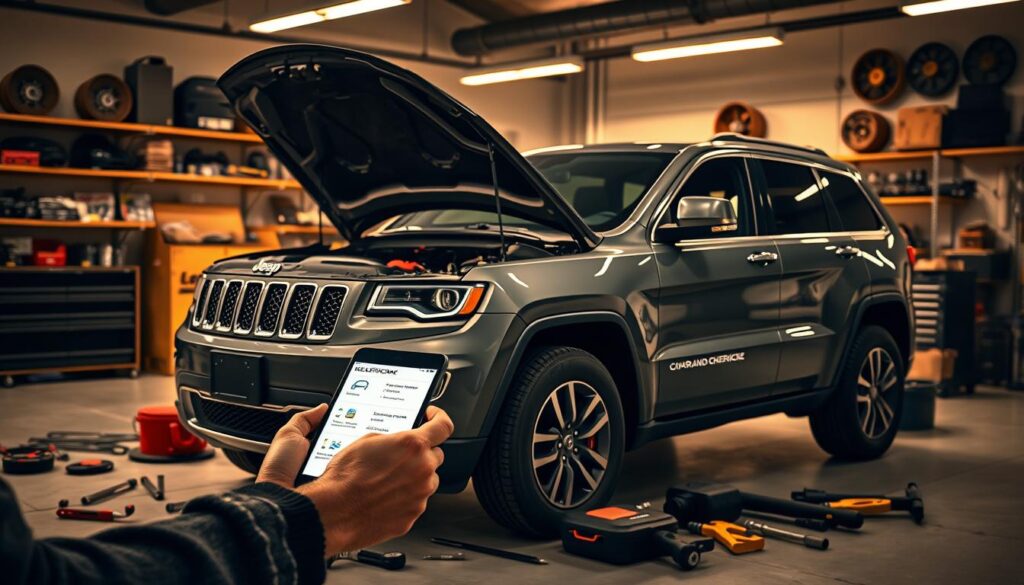
To get better gas mileage in a Jeep Grand Cherokee, you need a smart plan. This includes how you drive and take care of your vehicle. By following some simple tips, you can make your Jeep Grand Cherokee more fuel-efficient.
Driving smart is key to saving fuel. Try to accelerate smoothly, keep a steady speed, and brake slowly. Also, use cruise control when you can. This helps you use less gas.
- Maintain proper tire inflation
- Remove unnecessary weight from the vehicle
- Use recommended grade of motor oil
- Avoid extended idling
- Plan efficient routes
Regular maintenance is also important for better gas mileage. A well-tuned engine and clean air filters help a lot. Also, getting your vehicle serviced regularly can spot and fix problems that might lower fuel efficiency.
| Maintenance Action | Potential Fuel Savings |
|---|---|
| Regular air filter replacement | Up to 10% improvement |
| Proper wheel alignment | Up to 7% fuel efficiency |
| Spark plug maintenance | Up to 5% fuel economy boost |
The Jeep Grand Cherokee has special driving modes to save fuel. Eco mode makes your vehicle use less gas. It’s a great feature for those who want to save on fuel.
By using these tips, Jeep Grand Cherokee owners can improve their fuel economy. This means lower fuel costs and less harm to the environment.
Hybrid and Eco-Friendly Options in the Grand Cherokee Line
The Jeep Grand Cherokee is leading the way in fuel efficiency with new hybrid tech. Drivers who care about the environment can now choose from advanced options. These options make the Jeep Grand Cherokee much more fuel-efficient.
Jeep is dedicated to making cars that are good for the planet. Its 4xe plug-in hybrid lineup is a big step towards using less fuel. It keeps the high performance that SUV fans love.
4xe Plug-in Hybrid Performance
The 4xe model combines electric and gasoline power. This lets drivers save fuel in different ways:
- Electric-only mode for short urban trips
- Hybrid mode for balanced performance
- Regenerative braking technology
Future Green Technologies
Jeep is putting a lot of effort into making cars better for the environment. New green tech is coming. It will make the Grand Cherokee even more fuel-efficient and eco-friendly.
| Technology | Potential Fuel Efficiency Improvement |
|---|---|
| Advanced Battery Systems | 15-25% increased range |
| Lightweight Materials | 10-20% reduced energy consumption |
| Smart Energy Management | 5-15% improved overall efficiency |
The future of the Grand Cherokee is looking very green. Jeep is always working on new ways to make cars better for the planet and more efficient.
Maintenance Tips for Optimal Fuel Performance
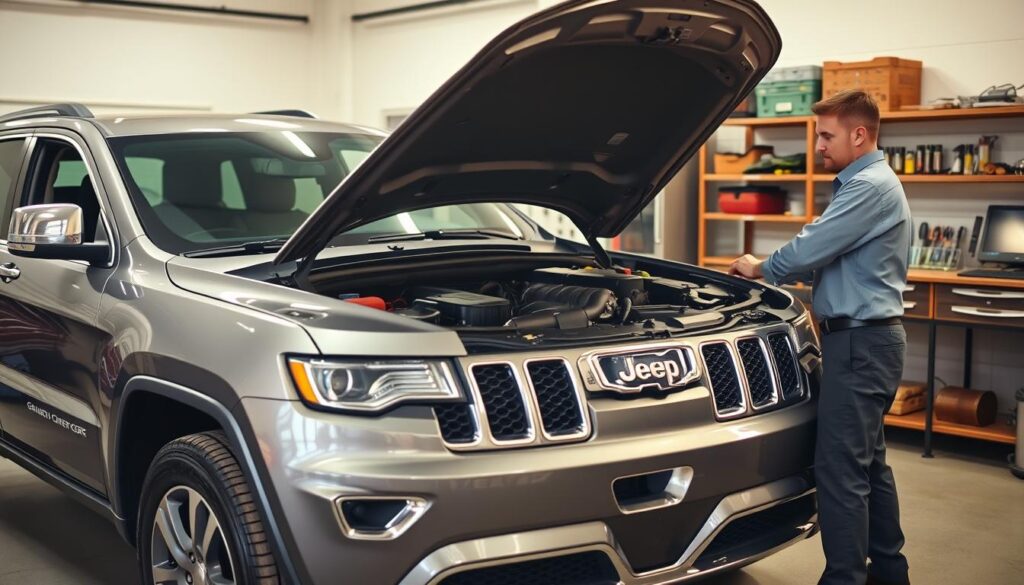
To get better gas mileage in your Jeep Grand Cherokee, you need to maintain it well. Regular care is key to keeping fuel efficiency up and fuel use down.
Here are some important steps to help your Jeep Grand Cherokee use less gas:
- Check tire pressure often
- Change air filters regularly
- Use the right motor oil
- Keep fuel injectors clean
- Do scheduled engine tune-ups
Keeping your Jeep Grand Cherokee in good shape is all about knowing what it needs. It’s about understanding how to keep it running smoothly.
| Maintenance Task | Frequency | Potential Fuel Savings |
|---|---|---|
| Tire Rotation | Every 5,000-7,500 miles | Up to 3% improvement |
| Air Filter Replacement | Every 15,000-30,000 miles | Up to 10% fuel efficiency |
| Spark Plug Replacement | Every 30,000-100,000 miles | Up to 2% fuel economy boost |
Experts say to watch your car’s performance to find ways to use less fuel. Keeping up with maintenance helps your Jeep Grand Cherokee run better. This saves you money and is good for the environment.
Cost Savings Analysis: Fuel Economy Benefits
Looking at the best gas mileage for Jeep Grand Cherokee is more than just about speed. It’s about saving money too. Choosing a fuel-efficient car means you get power and save cash.
Buying a Jeep Grand Cherokee that uses less fuel can save you a lot of money over time. The right model can cut down on fuel costs. This way, you get a top-notch SUV without breaking the bank.
Annual Fuel Cost Calculations
Calculating fuel costs shows big savings for Jeep Grand Cherokee owners. The exact amount depends on the model and how you drive:
- Base V6 models: About $1,500-$1,800 a year
- V8 performance models: Around $2,000-$2,400 a year
- Hybrid 4xe models: Could be as low as $1,200 a year
Long-term Savings
Long-term, the best gas mileage for Jeep Grand Cherokee is even more appealing. Over five years, fuel-efficient models can save you:
- Up to $3,000 in fuel costs compared to other SUVs
- Less harm to the environment
- Lower costs overall
Choosing the right model and keeping it in good shape can really pay off. This makes the Jeep Grand Cherokee a wise choice for those watching their budget.
Common Misconceptions About Grand Cherokee’s Fuel Efficiency
Many people think SUVs like the Jeep Grand Cherokee use a lot of gas. But, the Grand Cherokee shows that SUVs can be both big and fuel-efficient. It uses smart engineering and design to achieve this.
There are a few myths about the Grand Cherokee’s fuel performance that need to be debunked:
- Myth: All large SUVs have poor fuel economy
- Myth: Jeep vehicles prioritize power over efficiency
- Myth: Hybrid technology is required for good gas mileage
The fuel efficiency of the Jeep Grand Cherokee changes with different models and engines. Newer models have better gas mileage thanks to:
- Advanced engine management systems
- Aerodynamic body designs
- Lightweight materials
Drivers often don’t realize how well the Grand Cherokee balances power and fuel efficiency. Technological innovations have made this SUV a great choice for everyday driving and long trips.
To understand the Grand Cherokee’s fuel efficiency, we need to look beyond old ideas. We should focus on the latest engineering that saves gas without losing power or capability.
Competing SUVs’ Fuel Economy Comparison
When looking at the Jeep Grand Cherokee’s gas mileage, people want to know how it stacks up against others. The Grand Cherokee shows strong fuel efficiency across different models and trim levels.
Other midsize SUVs have their own fuel economy numbers. Our detailed look shows how the Grand Cherokee compares to similar vehicles.
| SUV Model | City MPG | Highway MPG | Combined MPG |
|---|---|---|---|
| Jeep Grand Cherokee | 19 | 26 | 22 |
| Ford Explorer | 18 | 25 | 21 |
| Toyota Highlander | 21 | 29 | 24 |
| Honda Pilot | 20 | 27 | 23 |
Key points about the Grand Cherokee include:
- It has balanced fuel efficiency across different engines.
- It has competitive MPG ratings in its class.
- It uses advanced engine management systems.
While some rivals might beat the Grand Cherokee in certain areas, its overall fuel economy is strong. It’s great for everyday driving.
For those looking for a mix of performance and fuel efficiency, the Jeep Grand Cherokee is a good choice. It stands out in the midsize SUV market.
Expert Reviews on Grand Cherokee’s Fuel Performance
Car experts have looked closely at the Jeep Grand Cherokee’s fuel efficiency. They’ve found it offers great fuel economy without sacrificing power. This makes it a standout in its class.
Top car reviewers have tested the Grand Cherokee’s fuel use. They’ve made some important points:
- The best gas mileage for Jeep Grand Cherokee changes with model year and engine type
- Experts say it’s among the most fuel-efficient SUVs out there
- Diesel and hybrid versions show the best fuel economy
Professional Testing Results
Independent groups have given detailed reviews of the Grand Cherokee’s fuel use. Car and Driver and Motor Trend have done thorough tests. These show how efficient the vehicle is.
| Model | City MPG | Highway MPG | Combined MPG |
|---|---|---|---|
| Grand Cherokee Limited | 19 | 26 | 22 |
| Grand Cherokee 4xe Hybrid | 23 | 29 | 25 |
Industry Expert Opinions
Car experts often talk about the Grand Cherokee’s fuel efficiency. They say it’s a great mix of power and fuel savings. This makes it a top pick for those looking for the best SUV fuel economy.
Technical experts say the Grand Cherokee’s fuel performance comes from new engine tech and design. These updates keep it a strong contender in the SUV market.
Future Improvements in Fuel Efficiency
Jeep is always looking to make the Grand Cherokee more fuel-efficient. They’re working on new technologies to help the car use less gas. This means better performance and being kinder to the environment.
There are a few areas where Jeep is making big strides:
- Advanced hybrid powertrain technologies
- Lightweight materials research
- Enhanced aerodynamic design
- Intelligent engine management systems
The 4xe plug-in hybrid technology is a big step forward. It mixes electric and gasoline power. This combo cuts down on gas use without losing the Grand Cherokee’s power.
| Technology | Potential Fuel Efficiency Improvement |
|---|---|
| Hybrid Powertrain | 25-35% increased fuel economy |
| Lightweight Aluminum Chassis | 10-15% weight reduction |
| Advanced Engine Management | 5-10% fuel efficiency gains |
Jeep is serious about making the Grand Cherokee better for the planet. They’re on the right track for cars that are fast and eco-friendly. The future is bright for those who want both.
Conclusion
The Jeep Grand Cherokee is a top SUV that mixes great performance with good fuel economy. If you want to get better gas mileage, there are many ways to do it. By using advanced engine tech and driving smart, you can cut down on fuel use without losing the Grand Cherokee’s legendary power.
Being fuel-efficient with the Grand Cherokee is more than just numbers. It’s about smart design and knowing how to drive well. To get better gas mileage, keep your vehicle in top shape, drive carefully, and learn how it works best. The newest Grand Cherokees show Jeep’s dedication to making SUVs that are both strong and fuel-friendly.
As car tech keeps getting better, the Grand Cherokee stays ahead in fuel-saving SUVs. Expect more updates in hybrid tech, engine control, and design to make it even more fuel-efficient. By using these tips, Grand Cherokee owners can enjoy both power and saving money on gas.
The future of the Jeep Grand Cherokee looks bright, with new ways to save fuel without losing its famous power. Whether you drive in the city or love adventures, the Grand Cherokee is a great choice. It offers both efficiency and the ability to handle any challenge.

